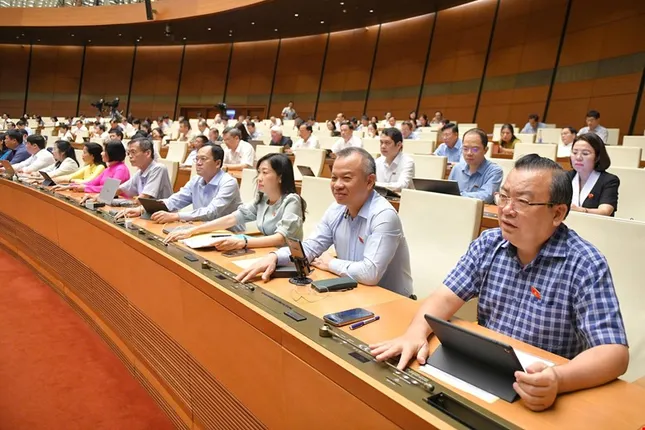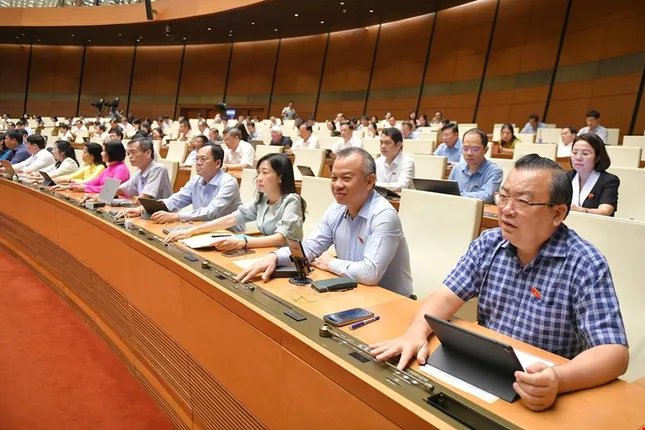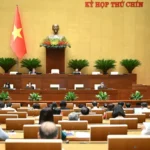On the morning of June 14th, the National Assembly passed the amended Law on Special Consumption Tax with an overwhelming majority of 448 out of 454 deputies present voting in favor, representing 93.72% of the vote. The amended Law on Special Consumption Tax, which comprises 11 articles, will come into force on January 1st, 2026.
Among the items subject to the special consumption tax are air conditioners with a capacity of over 24,000 BTU up to 90,000 BTU and sweetened beverages.

National Assembly passes the amended Law on Special Consumption Tax. Photo: QH
Prior to the vote, the Chairman of the Committee for Economic and Financial Affairs, Phan Van Mai, presented a report explaining the rationale behind the proposed law. Air conditioners, he noted, are major consumers of electrical energy and contributors to global warming, hence the need to regulate their production and consumption to protect the environment.
Nevertheless, the Standing Committee of the National Assembly concurred with the deputies’ observations regarding the widespread use of cooling appliances and air conditioners. As a result, the committee agreed with the drafters’ proposal to impose a special consumption tax on air conditioners with a capacity ranging from 24,000 BTU to 90,000 BTU. Air conditioners with a capacity below 24,000 BTU or above 90,000 BTU will be exempt from this tax.
No Expansion of Tax on Other Sugary Products
Additionally, sweetened beverages, as defined by Vietnamese standards, with a sugar content exceeding 5g/100ml, excluding dairy drinks and nutritional liquid foods, will be subject to the special consumption tax. This means that natural fruit juices, coconut water, dairy products, and nutritional liquid foods will not incur this tax.
During the previous discussion session, some deputies suggested a thorough assessment of the impact of imposing a tax on sweetened beverages before implementing any measures or timelines. They proposed exempting sweetened beverages from taxation at the present time.
In response, the Standing Committee of the National Assembly affirmed that taxing sweetened beverages is in line with the Party’s guidelines on protecting public health and the recommendations of the World Health Organization (WHO), the United Nations Children’s Fund (UNICEF), and the Ministry of Health.
Mr. Mai explained, “Imposing a special consumption tax on sweetened beverages is necessary and consistent with international practices to guide production and consumption and expand the tax base.”
Regarding the timeline, the approved law stipulates that the tax will not be applied to sweetened beverages in 2026. A tax rate of 8% will be imposed on these beverages starting in 2027, increasing to 10% from January 1st, 2028.
Furthermore, the Standing Committee of the National Assembly acknowledged that there are diverse opinions regarding the proposal to include other sugary products and goods and services in the scope of the tax, as suggested by some deputies.
Mr. Phan Van Mai clarified, “Up to now, there has not been sufficient impact assessment to serve as a basis and clearly demonstrate the superiority, feasibility, and appropriateness of imposing taxes on these goods and services in the current context.”
Notably, the law passed by the National Assembly maintains the special consumption tax on gasoline. Mr. Phan Van Mai explained that “in the context of needing to synchronously implement solutions to effectively realize the commitments of the Government of Vietnam at the COP26 Conference, along with the regulations on collecting environmental protection taxes, collecting special consumption taxes on gasoline in the current period is still necessary.”
“Creating a Robust and Innovative Mechanism for the Development of Haiphong City”
“Today, the National Assembly continued its 9th session, with discussions on a draft resolution on piloting several specific mechanisms and policies for the development of Hai Phong city. The debate was chaired by Vice Chairman of the National Assembly, Nguyen Duc Hai. This resolution aims to establish unique policies that will accelerate the growth and advancement of Hai Phong, a key urban center in Vietnam.”
The Home Secretary’s Heartfelt Words Ahead of a ‘Historic, Sacred Moment’
“These decisions are of historic significance and carry great strategic weight, as they are designed to shape the future and forge a new development paradigm for the nation,” expressed Minister of Home Affairs Pham Thi Thanh Tra.











































